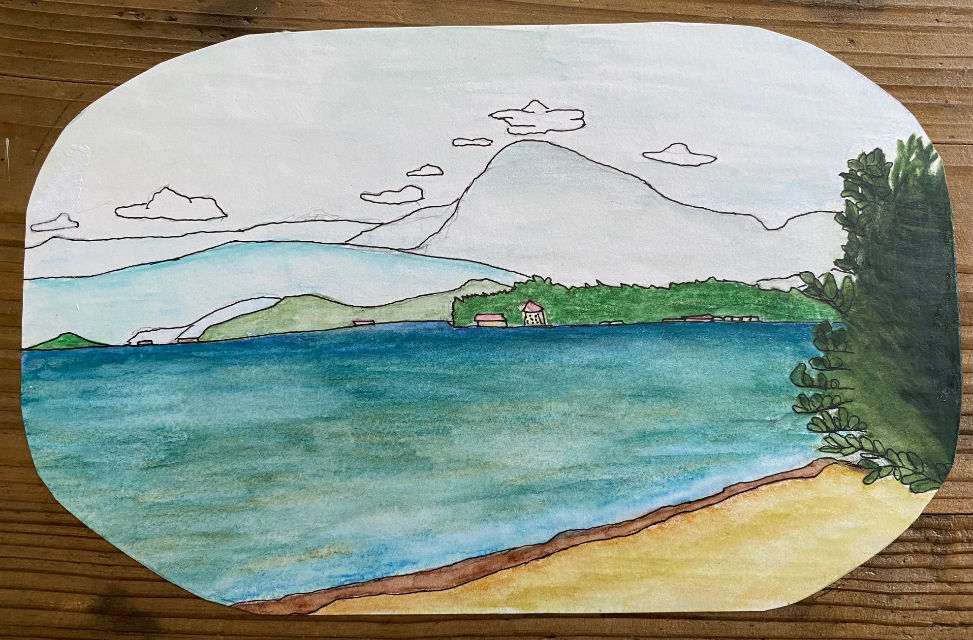COERCION
- Rebecca Otowa
- Sep 21, 2021
- 5 min read

"Broken Tile", original painting by Rebecca Otowa 2021
I’ve been thinking a lot about COVID and coercion lately. By this I mean, how the government tries to persuade people to behave responsibly in this crisis. Japan has set up “guidelines” and expected people to feel social pressure to conform to them, instead of issuing penalties for transgression. This is based on the gut-level feeling that coercion utilizes here, which is shame before others. Many Asian societies use this feelling, which arises from the judgment of other human beings (not deities) outside oneself; because membership in a group, in these societies, is very important, and this gives other human beings in one’s group the power to judge. Till very recently, the traditional Japanese seken no me (the Eye of the World) – public opinion – provided all the coercive power anyone would require. It was used to very good effect during World War II, when few people had a stake in the government’s imperialist plans, yet they participated, because everyone was being watched by everybody else, and no one wanted to “be seen as” uncooperative. The judgment comes from outside oneself, from other people in one’s group, and this is accepted.
If there is no penalty for transgression, what happens when a person disobeys? Shame, or fear of social judgment, is effective precisely because one is part of a group which can see and judge. Therefore the punishment is ostracization from the group (nakama-hazure). This used to be a cruel but effective way of dealing with badly-behaved children in Japan – they were locked out of the house, symbolically ousted from the family group. To these people, this is the worst punishment that can be imagined. Certainly it is with children (who have no place to go) and even with adults (who have internalized the feeling of “nowhere to go” except the group, and therefore fear ostracization). It takes a great deal of individual confidence to say “OK, bye!” and walk off into the sunset when ostracized. People in this kind of society are not raised to have such confidence; they must remain part of the group at all costs.
Conversely, in the West, the mechanism of guilt is based on individual autonomy, and is used as a coercive tactic – to “guilt-trip” a person into a feeling or action, such as using photos of big-eyed starving children to encourage contribution to charity. This works if people have been imbued with an inner mechanism, “conscience”, in early life, by society and religion. Interestingly, studies have shown that small children, like animals, when left to themselves, are usually more fair- or socially-minded than otherwise. Most very small children, for example, have no problem with sharing. It is, one might argue, after the precept “You have to share” (which sounds unpleasant and negative) has been repeated a few hundred times, that a child might think, “Why?” I have noticed, when observing parents and children, that parents often “pre-empt” what they think will be “bad” behavior by sneaking in some kind of command or warning (“Now, don’t… whatever”), even though the child may not have considered doing the “bad” thing at all, and these pre-emptive words push them over the edge. As adults, we are supposed to feel discomfort when we step outside the dictates of conscience, keeping us “in line”. Unfortunately, conscience has become too weak to be relied upon, so governments increasingly use laws and punishments to make it more painful to transgress than to conform.
Governments get their way by manipulating the population according to such cultural bases, with varying degrees of success. In countries where individual autonomy is the main driving force, laws are made with punishments for transgression. Success depends on the people’s agreement with, or opposition to, these laws (the people may resist on principle, because of individual autonomy – “No government’s going to tell me what to do” – whatever the original issue may be), and on the quality of information the people are using to decide. This last is what we see now, the media inflating certain pieces of information and suppressing others for their own purposes. There is also the “Bad Apple” syndrome, where laws that are meant to contain the few people that act “bad” negatively affect the bulk of the population. In countries where the group is all-powerful, the success of governmental manipulation depends on whether it is adopted and distributed by members of the group watching each other. In Japan recently, the Eye of the World is breaking down somewhat, but individual autonomy and guilt are still very much over the horizon in terms of efficiency of coercion. Government hands are tied by not being able to impose laws of behavior, which would approach fascism, according to the constitution drawn up by American occupation forces after WWII, so they still mostly rely on social pressure.
We human beings are very good at individual coercion: getting people to do what we want. By using our power, we can make others in our immediate circle (or far beyond that) conform to our own plans.
For example, we can coerce the people we are close to by various means – we may flatter, cajole, or employ other strategies (manipulation, passive-aggression, gaslighting, etc.) to “get our way”. In even darker scenarios, we can control others by the threat or use of violence or abuse. Usually, violence – physical, mental, or emotional – is the most powerful factor in determining whether coercion will work. To hang violence over someone’s head produces fear. And, to quote Margaret Atwood, “Fear is the only thing that works.” No one wants pain. Most of us will go to extraordinary lengths to avoid it.
Ordinary honesty is a better course, needless to say. Imagine my husband wants to go on a bike ride after a long session at the computer. He invites me, but I would rather stay home in solitude. I tell him he deserves the bike ride after working so hard, and remind him that I am usually not the best companion on these rides, as he always has to wait for me (I’m slower) and I often complain about hills, etc. This usually ends by him taking the bike ride himself, adventuring around, and me having a few hours to myself. Everybody wins. This scenario could play out very differently if coercion was involved. I might remind him of jobs to be done around the house by saying “Well, the lawn needs to be raked, but never mind, I’ll do it” (manipulation through martyrdom), or he might say “You never want to do anything with me” (manipulation through guilt-tripping). In either of these cases, we might get our way: my husband might rake the lawn instead of riding his bike, or I might feel guilty and go with him on the trip, but we would feel the coercion, and our relationship would suffer. Too bad honesty sometimes isn’t strong enough to “get our way”, and we resort to manipulation.
My fervent wish is that we human beings can learn to relate to each other through honesty rather than coercion, and that we can proceed through these difficult times with civility and respect for all.



Very thought-provoking message. It is easy to be honest without civility or kindness. You could have just as likely said, "No thanks, I'm not interested." But that may have created an unpleasant feeling for your husband. Giving him a reason as to why your going on the ride was not the best idea, made it easier for him to accept your reply.
Most of us are used to being told things in ways to soften any disappointment for receiving negative information. "Polite fiction" about some topics is the way it has been done for so long, it is a great shock and causes much upheaval when someone is honest about the topic (sometimes deliberately brutally honest, which borders on being…